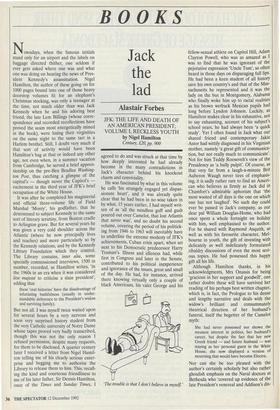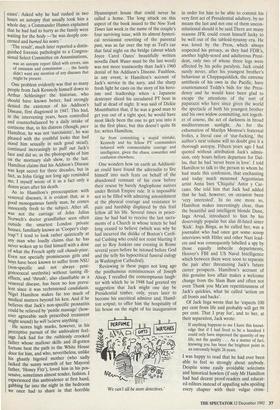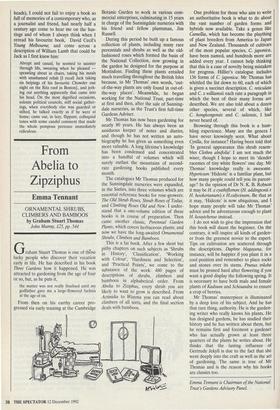BOOKS
Jack the lad
Alastair Forbes
JFK: THE LIFE AND DEATH OF AN AMERICAN PRESIDENT; VOLUME I, RECKLESS YOUTH by Nigel Hamilton Century, £20, pp. 900 Nowadays, when the famous initials stand only for an airport and the labels on baggage directed thither, one seldom if ever gets asked where one was and what one was doing on hearing the news of Pres- ident Kennedy's assassination. Nigel Hamilton, the author of these going on for 1000 pages bound into one of those heavy doorstop volumes fit for an elephant's Christmas stocking, was only a teenager at the time, not much older than was Jack Kennedy when he and his adoring best friend, the late Lem Billings (whose corre- spondence and recorded recollections have proved the seam most energetically mined in the book), were losing their virginities on the same night to the same tart in a Harlem brothel. Still, I doubt very much if that sort of activity would have been Hamilton's bag at that or indeed any other age, not even when, in a summer vacation from Cambridge, he served a brief appren- ticeship on the pre-Ben Bradlee Washing- ton Post, thus catching a glimpse of the capital's — though never the Capitol's excitement in the third year of JFK's brief occupation of the White House. It was after he completed his magisterial and official three-volume life of Field Marshal 'Monty', his godfather, that he determined to subject Kennedy to the same sort of literary scrutiny, from Boston cradle to Arlington grave. But for several years he was given a very cold shoulder across the Atlantic (where he now principally lives and teaches) and more particularly so by the Kennedy relations, and by the Kennedy Library Foundation which they control. The Library contains, inter alia, some specially commissioned interviews, 1500 in number, recorded, as Hamilton writes, 'in the 1960s in an era when it was considered lese majeste to criticise a slain president', adding that
these 'oral histories' have the disadvantage of infuriating bashfulness (usually in under- standable deference to the President's widow and surviving family).
But not all. I was myself twice waited upon for several hours by a very nervous and soon very surprised history student from the very Catholic university of Notre Dame whose tapes proved very badly transcribed, though this was not the only reason I refused permission, despite many requests, for them to be disclosed. A quarter century later I received a letter from Nigel Hamil- ton telling me of his clearly serious enter- prise and begging me to authorise the Library to release them to him. This, recall- ing the kind and courteous friendliness to me of his later father, Sir Dennis Hamilton, once of the Times and Sunday Times, I agreed to do and was struck at that time by how deeply interested he had already become in the many contradictions in Jack's character behind his knockout charm and conviviality.
He was fascinated by what in this volume he calls 'his strangely engaged yet dispas- sionate heart', and it was already quite clear that he had been in no wise taken in by what, 15 years earlier, I had myself writ- ten of as 'all the mindless guff and gush poured out over Camelot, that lost Atlantis that never was', and no doubt his second volume, covering the period of his politick- ing from 1946 to 1963 will inevitably have to underline the extreme modesty of JFK's achievements, Cuban crisis apart, when set next to his Democratic predecessor Harry Truman's. Illness and idleness had, while first in Congress and later in the Senate, contributed to his political inexperience and ignorance of the issues, great and small of the day. He had, for instance, arrived there knowing virtually only a couple of black Americans, his valet George and his `The trouble is that I don't believe in myself.'
fellow-sexual athlete on Capitol Hill, Adam Clayton Powell, who was as amazed as was to find that he was ignorant of the pejorative expression 'Uncle Tom', so often heard in those days on disparaging full lips. He had been a keen student of all history save his own country's and that of the Mas- sachusetts he represented and it was the lady on the bus in Montgomery, Alabama who finally woke him up to racial realities as his brown wetback Mexican pupils had long before Lyndon Johnson. Luckily, as Hamilton makes clear in his exhaustive, not to say exhausting, account of his subject's school years, he had always been 'a quick study'. Yet I often found in Jack what our shared friend and contemporary Jakie Astor had wittily diagnosed in his Virginian mother, namely 'a great gift of communica- tion, but not really much to communicate'. Not for him Teddy Roosevelt's view of the Presidency as 'a bully pulpit'. Of course, as that very far from a laugh-a-minute Brit Auberon Waugh never tires of emphasis- ing, it is sadly rather rare to find an Ameri- can who believes as firmly as Jack did in Chamfort's admirable aphorism that 'the most wasted of all days is the one on which one has not laughed'. No such day could ever be passed in Jack's company, as our dear pal William Douglas-Home, who had once spent a whole fortnight on holiday with him, well emphasised to the author. For he shared with Raymond Asquith, as well as with his favourite character, Mel- bourne in youth, the gift of investing with delicately as well indelicately formulated ribaldry discussions of even the most seri- ous topics. He had possessed this happy gift all his life. Although Hamilton thanks, in his acknowledgments, Mrs Onassis for being `gracious in her support and goodwill', one rather doubts these will have survived her reading of his perhaps best written chapter, which is, in fact, the Prologue to his dense and lengthy narrative and deals with the widow's brilliant and consummately theatrical direction of her husband's funeral, itself the begetter of the Camelot myth:
She had never possessed nor shown the meanest interest in politics, her husband's career, but despite the fact that her new Greek friend — and future husband — was staying as her personal guest in the White House, she now displayed a version of mourning that would have become Electra.
Nor can she be too pleased with the author's certainly scholarly but also rather ghoulish emphasis on the Naval doctors at Bethesda who 'covered up evidence of the late President's venereal and Addison's dis- eases'. Asked why he had rushed in two hours an autopsy that usually took him a whole day, a Commander Humes explained that he had had to hurry as the family were waiting for the body =he was deeply con- cerned and burned his notes.'
`The result', much later reported a distin- guished forensic pathologist to a Congres- sional Select Committee on Assassinations, was an autopsy report filled with errors, sins of omission and commission . . . the family didn't want any mention of any diseases that might be present.
One problem evidently was that so many people from Jack Kennedy himself down to Arthur Schlesinger the historian, who should have known better, had strongly denied the existence of his Addison's D. isease, first diagnosed in 1947. This had, in the intervening years, been controlled and counterbalanced by a daily intake of cortisone that, to his distress (though, pace Hamilton, he was not 'narcissistic', he was pleased with the youthful looks that had stood him sexually in such good stead), continued increasingly to puff out Jack's face and did so, as the photographs of him on the mortuary slab show, to the last. Hamilton claims that his Addison's Disease was kept secret for three decades, but in fact, as John Grigg not long ago reminded me, I myself wrote of it as a fact only a dozen years after his death. As to Hamilton's preoccupation with venereal diseases, it is evident that, as a good monogamous family man, he comes innocently fresh to the subject. After all, was not the carriage of John Julius Norwich's doctor grandfather seen often outside the smartest London private houses, familiarly known as 'Cooper's clap- trap'? I tend to look rather quizzically at any man who loudly claims that he has never woken up to find himself with a dose of what the French aptly call chaude-pisse. Even not specially promiscuous girls and boys have been known to suffer from NSU (non-specific and not always post- gonococcal urethritis) without lasting ill- effects, and 'thrush', also classifiable as a venereal disease, has been no less preva- lent since it was rechristened candidiasis. Nigel Hamilton makes far too much of medical matters beyond his ken. And if he believes that Jack's non-specific prostatitis could be relieved by 'penile massage' (how- ever agreeable such prescribed treatment might sound) he will believe anything. He scores high marks, however, in his perceptive pursuit of the ambivalent feel- ings Jack had for the ruthlessly crooked father whose mafioso skills and ill-gotten fortune beat the path to the White House door for him, and who, nevertheless, unlike his ghastly bigoted mother (who sadly lacked the sunny warmth of her Mayoral father, 'Honey Fitz'), loved him in his pos- sessive, sometimes almost tender, fashion. I experienced this ambivalence at first hand, gabbing far into the night in the bedroom we once had to share in that horrible Hyannisport house that could never be called a home. The long attack on this aspect of the book issued to the New York Times last week in the name of the couple's four surviving issue, with its almost hysteri- cal revisionist rewriting of the parental past, was as far over the top as Ted's car that fatal night on the bridge (about which Joyce Carol Oates' beautifully written novella Dark Water must be the last word) was not more trustworthy than Jack's 1960 denial of his Addison's Disease. Faultless, in any event, is Hamilton's account of Jack's service in the navy, and the sharp fresh light he casts on the story of his hero- ism and leadership when a Japanese destroyer sliced his unradared PT boat in half at dead of night. It was said of Dickie Mountbatten that, if he was a good man to get you out of a tight spot, he would have most likely been the one to get you into it in the first place, but this doesn't quite fit for, writes Hamilton,
far from committing a stupid mistake, Kennedy and his fellow PT commanders behaved with commendable courage and intelligence, given the chaos, cowardice and confusion elsewhere.
One wonders how on earth an Addisoni- an could have found the adrenalin to fire himself into such feats on behalf of the abandoned remnant of his crew before their rescue by barely Anglophone natives under British Empire rule. It is impossible not to be filled with admiring astonishment at the physical courage and resistance to pain and hardship displayed by this frail fellow all his life. Several times in peace- time he had had to receive the last sacra- ments of a Church in whose tenets he had long ceased to believe (which was why he had incurred the dislike of Boston's Cardi- nal Cushing who could not resist blurting it out to Roy Jenkins one evening in Rome several years before he intoned before God and the telly his hypocritical funeral eulogy in Washington Cathedral).
Reviewing in these pages not long ago the posthumous reminiscences of Joseph Alsop, I recalled the contemptuous laugh- ter with which he in 1948 had greeted my suggestion that Jack might one day be Presidential timber, only, years later to become his uncritical admirer and, Hamil- ton scripsit, to offer him the hospitality of his house on the night of his inauguration 'We can't all be store detectives.'
in order for him to be able to commit his very first act of Presidential adultery, by no means the last and not one of them uncon- stitutional should it be said.There are many reasons JFK could count himself lucky to be well out of the tabloid-tyranny era. He was loved by the Press, which always respected his privacy, as they had FDR's, another highly-sexed and adulterous Presi- dent, only two of whose three legs were affected by his polio paralysis. Jack could surely never, after his youngest brother's behaviour at Chappaquiddick, the extreme antithesis of his own in the Pacific, have countenanced Teddy's bids for the Presi- dency and he would have been glad to escape the attentions of the sort of paparazzi who have since given the world the spectacle of both his youngest brother and his own widow committing, not togeth- er of course, the act of darkness in broad mediterranean sunlight. As for the exhumation of Marilyn Monroe's fraternal frolics, a literal case of 'star-fucking,' the author's next volume will no doubt give it a thorough autopsy. Fifteen years ago I had quoted without attribution Jack's admis- sion, only hours before departure for Dal- las, that he had 'never been in love'. I told Hamilton to talk to the person to whom he had made this confession, that enchanting and today much mourned Argentinian artist Anna Ines `Chiquita' Astor y Car- cano. She told him that Jack had added that he had, however, on occasion been `very interested'. In no one more so, Hamilton makes interestingly clear, than the beautiful and intelligent blonde Dane, Inga Arvad, introduced to him by his deservingly popular but alas ill-fated sister `Kick'. Inga Binga, as he called her, was a journalist who had once got some scoop interviews with Hitler and other Nazi lead- ers and was consequently labelled a spy by those equally imbecile departments, Hoover's FBI and US Naval Intelligence which between them were soon to separate the pair after threatening Jack's future career prospects. Hamilton's account of this genuine love affair makes a welcome change from the Slam Bam and often not even Thank you Ma'am repetitiousness of Jack's quickies, what he called 'action on all fronts and backs'.
Of Jack Inga wrote that he 'expects 100 per cent from life and probably will get 99 per cent. That I pray for', and to her, at their separation, Jack wrote:
If anything happens to me I have this knowl- edge that if I had lived to be a hundred I could only have improved the quantity of my life, not the quality . . . As a matter of fact, knowing you has been the brightest point in an extremely bright 26 years.
I was happy to read that he had ever been able to feel so strongly about anybody. Despite some easily avoidable solecisms and historical howlers (if only Mr Hamilton had had decent proof-readers and educat- ed editors instead of appalling subs spoiling every chapter with their vulgar cross- heads), I could not fail to enjoy a book so full of memories of a contemporary who, as a journalist and friend, had nearly half a century ago come to hear me on the hus- tings and of whom I always think when I reread his favourite book, David Cecil's Young Melbourne, and come across a description of William Lamb that could be Jack as I first knew him: Abrupt and casual, he seemed to saunter through life, swearing when he pleased sprawling about in chairs, taking his meals with unashamed relish [I recall Jack taking six helpings of his favourite Chowder one night on the Ritz roof in Boston], and jerk- ing out anything apparently that came into his head. On the most dignified occasions, solemn political councils, stiff social gather- ings, when everybody else was guarded or stilted, he talked exactly as if he were at home; came out, in lazy, flippant, colloquial tones with some candid comment that made the whole pompous pretence immediately ridiculous.




































































 Previous page
Previous page